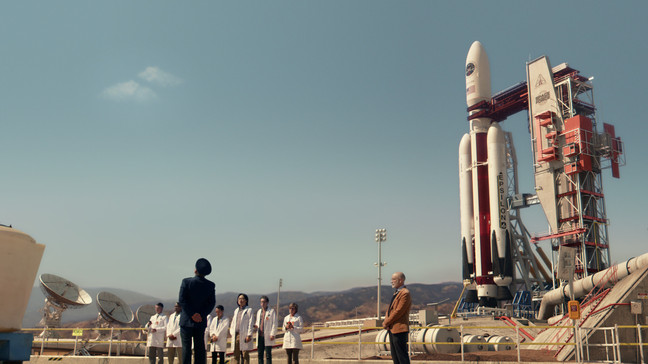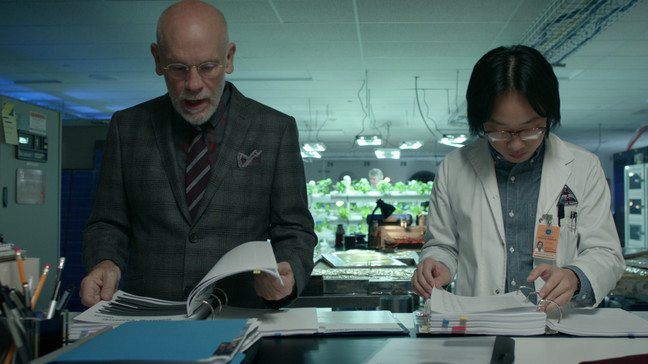Review: 'Space Force' plots a strange trajectory, finds its course in the end
SALT LAKE CITY (KUTV) — In Netflix's new comedy "Space Force," Steve Carell leads a talented cast as Mark R. Naird, a newly decorated four-star general with aspirations of heading the Air Force, is assigned to lead the newly created Space Force. He’s less than thrilled.
{sd-embed class="sd-embedded-media" data-alt="SF_104_SG_00005RC.jpg" data-caption="SPACE%20FORCE%20(L%20TO%20R)%20STEVE%20CARELL%20as%20GENERAL%20MARK%20R.%20NAIRD%20in%20episode%20104%20of%20SPACE%20FORCE%20(Photo:%20Netflix)" data-duration="" data-externalid="3ef52d06-5fff-47a8-8dd0-f4c9702eb91a" data-mediatype="image" data-renditions="%7B%22large16x9%22:%7B%22blurSigma%22:-1,%22height%22:1822,%22label%22:%22large16x9%22,%22scaleWidth%22:986,%22url%22:%22/resources/media/6e9daffa-4344-427c-b1c9-0f2b15ca859d-large16x9_SF_104_SG_00005RC.jpg?1590449584119%22,%22width%22:3240,%22x%22:0,%22y%22:128,%22uuid%22:null,%22id%22:%22a886722c-9c9e-47dd-bd0b-54910b5c97c7%22,%22preciseWidth%22:null,%22preciseHeight%22:null,%22name%22:%22large16x9Url%22,%22rendition%22:%22large16x9%22,%22labelOrConvertedName%22:%22large16x9%22%7D,%22jumbo16x9%22:%7B%22blurSigma%22:-1,%22height%22:1822,%22label%22:%22jumbo16x9%22,%22scaleWidth%22:1320,%22url%22:%22/resources/media/6e9daffa-4344-427c-b1c9-0f2b15ca859d-jumbo16x9_SF_104_SG_00005RC.jpg?1590449583701%22,%22width%22:3240,%22x%22:0,%22y%22:128,%22uuid%22:null,%22id%22:%22c9c6a05b-faa9-4d18-8267-a8ad5418f953%22,%22preciseWidth%22:null,%22preciseHeight%22:null,%22name%22:%22jumbo16x9Url%22,%22rendition%22:%22jumbo16x9%22,%22labelOrConvertedName%22:%22jumbo16x9%22%7D,%22small16x9%22:%7B%22blurSigma%22:-1,%22height%22:1822,%22label%22:%22small16x9%22,%22scaleWidth%22:160,%22url%22:%22/resources/media/6e9daffa-4344-427c-b1c9-0f2b15ca859d-small16x9_SF_104_SG_00005RC.jpg?1590449583506%22,%22width%22:3240,%22x%22:0,%22y%22:128,%22uuid%22:null,%22id%22:%22f54eb429-31fb-43b2-a7cb-571cb1a4339a%22,%22preciseWidth%22:null,%22preciseHeight%22:null,%22name%22:%22small16x9Url%22,%22rendition%22:%22small16x9%22,%22labelOrConvertedName%22:%22small16x9%22%7D,%22full16x9%22:%7B%22blurSigma%22:-1,%22height%22:1822,%22label%22:%22full16x9%22,%22scaleWidth%22:3240,%22url%22:%22/resources/media/6e9daffa-4344-427c-b1c9-0f2b15ca859d-full16x9_SF_104_SG_00005RC.jpg?1590449589050%22,%22width%22:3240,%22x%22:0,%22y%22:128,%22uuid%22:null,%22id%22:%22ae6107a7-4774-44e6-9b2b-5512c0d67ac8%22,%22preciseWidth%22:null,%22preciseHeight%22:null,%22name%22:%22full16x9Url%22,%22rendition%22:%22full16x9%22,%22labelOrConvertedName%22:%22full16x9%22%7D,%22medium16x9%22:%7B%22blurSigma%22:-1,%22height%22:1822,%22label%22:%22medium16x9%22,%22scaleWidth%22:648,%22url%22:%22/resources/media/6e9daffa-4344-427c-b1c9-0f2b15ca859d-medium16x9_SF_104_SG_00005RC.jpg?1590449590808%22,%22width%22:3240,%22x%22:0,%22y%22:128,%22uuid%22:null,%22id%22:%22e49c16a7-27ec-4bb6-9a89-25a914a59958%22,%22preciseWidth%22:null,%22preciseHeight%22:null,%22name%22:%22medium16x9Url%22,%22rendition%22:%22medium16x9%22,%22labelOrConvertedName%22:%22medium16x9%22%7D%7D" data-thumburl="/resources/media/6e9daffa-4344-427c-b1c9-0f2b15ca859d-medium16x9_SF_104_SG_00005RC.jpg?1590449590808" data-title="SF_104_SG_00005RC.jpg" data-url="" data-embed-file="%0A%20%20%20%20%3Cdiv%20class=%22sda-ImageEmbed%22%3E%0A%20%20%20%20%20%20%20%20%3Cimg%20src=%22/resources/media/6e9daffa-4344-427c-b1c9-0f2b15ca859d-medium16x9_SF_104_SG_00005RC.jpg?1590449590808%22%20alt=%22%22%20/%3E%0A%20%20%20%20%20%20%20%20%3Cdiv%20class=%22sda-ImageEmbed-caption%22%3ESPACE%20FORCE%20(L%20TO%20R)%20STEVE%20CARELL%20as%20GENERAL%20MARK%20R.%20NAIRD%20in%20episode%20104%20of%20SPACE%20FORCE%20(Photo:%20Netflix)%3C/div%3E%0A%20%20%20%20%3C/div%3E%0A" data-embed-type="image" contenteditable="false"}{/sd-embed}
Created by “The Office” alums Carell and writerGreg Daniels, “Space Force” is a farce that, at least initially, is reminiscent of an Armando Iannucci production (“Veep,” “The Thick of It”) as it presents a fictional narrative that is heavily influenced by real world politics.
Even in its most ridiculous moments, which are primarily saved for the final episodes, there is a scathing social commentary boiling just beneath the surface. The fact that anything in this series is possible (not necessarily probable) is terrifying. If you’re able to take a step back, it’s also very funny.
{sd-embed class="sd-embedded-media" data-alt="SF_102_SG_00018R.jpg" data-caption="SPACE%20FORCE%20(L%20TO%20R)%20EXIE%20BOOKER%20as%20DR.%20WASHINGTON%20and%20JOHN%20MALKOVICH%20as%20DR.%20ADRIAN%20MALLORY%20in%20episode%20102%20of%20SPACE%20FORCE%20%20(Photo:%20Netflix)" data-duration="" data-externalid="07cfbd15-65d2-4182-aa12-0df354acbed2" data-mediatype="image" data-renditions="%7B%22large16x9%22:%7B%22blurSigma%22:-1,%22height%22:2160,%22label%22:%22large16x9%22,%22scaleWidth%22:986,%22url%22:%22/resources/media/07cfbd15-65d2-4182-aa12-0df354acbed2-large16x9_SF_102_SG_00018R.jpg?1590444704197%22,%22width%22:3840,%22x%22:458,%22y%22:0,%22uuid%22:null,%22id%22:%2296b99eaf-a466-4740-ae2c-3870437782aa%22,%22preciseWidth%22:null,%22preciseHeight%22:null,%22name%22:%22large16x9Url%22,%22rendition%22:%22large16x9%22,%22labelOrConvertedName%22:%22large16x9%22%7D,%22jumbo16x9%22:%7B%22blurSigma%22:-1,%22height%22:2160,%22label%22:%22jumbo16x9%22,%22scaleWidth%22:1320,%22url%22:%22/resources/media/07cfbd15-65d2-4182-aa12-0df354acbed2-jumbo16x9_SF_102_SG_00018R.jpg?1590444702447%22,%22width%22:3840,%22x%22:458,%22y%22:0,%22uuid%22:null,%22id%22:%22cafd0a27-abee-43ae-aa0c-a0fd6107acc8%22,%22preciseWidth%22:null,%22preciseHeight%22:null,%22name%22:%22jumbo16x9Url%22,%22rendition%22:%22jumbo16x9%22,%22labelOrConvertedName%22:%22jumbo16x9%22%7D,%22small16x9%22:%7B%22blurSigma%22:-1,%22height%22:2160,%22label%22:%22small16x9%22,%22scaleWidth%22:160,%22url%22:%22/resources/media/07cfbd15-65d2-4182-aa12-0df354acbed2-small16x9_SF_102_SG_00018R.jpg?1590444712127%22,%22width%22:3840,%22x%22:458,%22y%22:0,%22uuid%22:null,%22id%22:%2292cd60de-daba-4842-a417-8c6c88639b61%22,%22preciseWidth%22:null,%22preciseHeight%22:null,%22name%22:%22small16x9Url%22,%22rendition%22:%22small16x9%22,%22labelOrConvertedName%22:%22small16x9%22%7D,%22full16x9%22:%7B%22blurSigma%22:-1,%22height%22:2160,%22label%22:%22full16x9%22,%22scaleWidth%22:3840,%22url%22:%22/resources/media/07cfbd15-65d2-4182-aa12-0df354acbed2-full16x9_SF_102_SG_00018R.jpg?1590444705243%22,%22width%22:3840,%22x%22:458,%22y%22:0,%22uuid%22:null,%22id%22:%22f4c32762-8766-403b-8887-d5a1c4b85fe9%22,%22preciseWidth%22:null,%22preciseHeight%22:null,%22name%22:%22full16x9Url%22,%22rendition%22:%22full16x9%22,%22labelOrConvertedName%22:%22full16x9%22%7D,%22medium16x9%22:%7B%22blurSigma%22:-1,%22height%22:2160,%22label%22:%22medium16x9%22,%22scaleWidth%22:648,%22url%22:%22/resources/media/07cfbd15-65d2-4182-aa12-0df354acbed2-medium16x9_SF_102_SG_00018R.jpg?1590444702583%22,%22width%22:3840,%22x%22:458,%22y%22:0,%22uuid%22:null,%22id%22:%22660bccb5-4c34-49d3-add2-d16b83505e4e%22,%22preciseWidth%22:null,%22preciseHeight%22:null,%22name%22:%22medium16x9Url%22,%22rendition%22:%22medium16x9%22,%22labelOrConvertedName%22:%22medium16x9%22%7D%7D" data-thumburl="/resources/media/07cfbd15-65d2-4182-aa12-0df354acbed2-medium16x9_SF_102_SG_00018R.jpg?1590444702583" data-title="SF_102_SG_00018R.jpg" data-url="" data-embed-file="%0A%20%20%20%20%3Cdiv%20class=%22sda-ImageEmbed%22%3E%0A%20%20%20%20%20%20%20%20%3Cimg%20src=%22/resources/media/07cfbd15-65d2-4182-aa12-0df354acbed2-medium16x9_SF_102_SG_00018R.jpg?1590444702583%22%20alt=%22%22%20/%3E%0A%20%20%20%20%20%20%20%20%3Cdiv%20class=%22sda-ImageEmbed-caption%22%3ESPACE%20FORCE%20(L%20TO%20R)%20EXIE%20BOOKER%20as%20DR.%20WASHINGTON%20and%20JOHN%20MALKOVICH%20as%20DR.%20ADRIAN%20MALLORY%20in%20episode%20102%20of%20SPACE%20FORCE%20%20(Photo:%20Netflix)%3C/div%3E%0A%20%20%20%20%3C/div%3E%0A" data-embed-type="image" contenteditable="false"}{/sd-embed}
Carell’s General Naird is far more amiable than his Michael Scott character, but there are similarities. Naird isn’t a complete buffoon, but he is utterly unqualified. He’s been set up to fail by the same system that demands he succeed. Naird is cognizant of his situation. He's been finishing in second place for most of his life.
{sd-embed class="sd-embedded-media" data-alt="HEX_105_Unit_03059R2.jpg" data-caption="DIANA%20SILVERS%20as%20ERIN%20NAIRD%20in%7B%7D%20SPACE%20FORCE%20(Photo:%20AARON%20EPSTEIN/NETFLIX)" data-duration="" data-externalid="5be0a08a-7418-4dd0-8102-135fc34b6b37" data-mediatype="image" data-renditions="%7B%22jumbo16x9%22:%7B%22blurSigma%22:-1,%22height%22:2025,%22label%22:%22jumbo16x9%22,%22scaleWidth%22:1320,%22url%22:%22/resources/media/4fe22504-e6b7-4a9d-8846-92db919a8939-jumbo16x9_HEX_105_Unit_03059R2.jpg?1590449533521%22,%22width%22:3600,%22x%22:0,%22y%22:98,%22uuid%22:null,%22id%22:%22643ab65d-317d-4830-8337-55a8b2e01fb9%22,%22preciseWidth%22:null,%22preciseHeight%22:null,%22name%22:%22jumbo16x9Url%22,%22rendition%22:%22jumbo16x9%22,%22labelOrConvertedName%22:%22jumbo16x9%22%7D,%22large16x9%22:%7B%22blurSigma%22:-1,%22height%22:2025,%22label%22:%22large16x9%22,%22scaleWidth%22:986,%22url%22:%22/resources/media/4fe22504-e6b7-4a9d-8846-92db919a8939-large16x9_HEX_105_Unit_03059R2.jpg?1590449533331%22,%22width%22:3600,%22x%22:0,%22y%22:98,%22uuid%22:null,%22id%22:%227a9e9bb2-e7fa-4925-848c-a4d5b98f64dc%22,%22preciseWidth%22:null,%22preciseHeight%22:null,%22name%22:%22large16x9Url%22,%22rendition%22:%22large16x9%22,%22labelOrConvertedName%22:%22large16x9%22%7D,%22small16x9%22:%7B%22blurSigma%22:-1,%22height%22:2025,%22label%22:%22small16x9%22,%22scaleWidth%22:160,%22url%22:%22/resources/media/4fe22504-e6b7-4a9d-8846-92db919a8939-small16x9_HEX_105_Unit_03059R2.jpg?1590449533040%22,%22width%22:3600,%22x%22:0,%22y%22:98,%22uuid%22:null,%22id%22:%22e4d334b8-fc08-4134-af1c-f842dfc2b88a%22,%22preciseWidth%22:null,%22preciseHeight%22:null,%22name%22:%22small16x9Url%22,%22rendition%22:%22small16x9%22,%22labelOrConvertedName%22:%22small16x9%22%7D,%22full16x9%22:%7B%22blurSigma%22:-1,%22height%22:2025,%22label%22:%22full16x9%22,%22scaleWidth%22:3600,%22url%22:%22/resources/media/4fe22504-e6b7-4a9d-8846-92db919a8939-full16x9_HEX_105_Unit_03059R2.jpg?1590449541129%22,%22width%22:3600,%22x%22:0,%22y%22:98,%22uuid%22:null,%22id%22:%22971f373e-dfd8-4b07-a897-d44f4fc37f57%22,%22preciseWidth%22:null,%22preciseHeight%22:null,%22name%22:%22full16x9Url%22,%22rendition%22:%22full16x9%22,%22labelOrConvertedName%22:%22full16x9%22%7D,%22medium16x9%22:%7B%22blurSigma%22:-1,%22height%22:2025,%22label%22:%22medium16x9%22,%22scaleWidth%22:648,%22url%22:%22/resources/media/4fe22504-e6b7-4a9d-8846-92db919a8939-medium16x9_HEX_105_Unit_03059R2.jpg?1590449543627%22,%22width%22:3600,%22x%22:0,%22y%22:98,%22uuid%22:null,%22id%22:%2267ac7501-ccfd-497d-9ae1-e1593ff4d236%22,%22preciseWidth%22:null,%22preciseHeight%22:null,%22name%22:%22medium16x9Url%22,%22rendition%22:%22medium16x9%22,%22labelOrConvertedName%22:%22medium16x9%22%7D%7D" data-thumburl="/resources/media/4fe22504-e6b7-4a9d-8846-92db919a8939-medium16x9_HEX_105_Unit_03059R2.jpg?1590449543627" data-title="HEX_105_Unit_03059R2.jpg" data-url="" data-embed-file="%0A%20%20%20%20%3Cdiv%20class=%22sda-ImageEmbed%22%3E%0A%20%20%20%20%20%20%20%20%3Cimg%20src=%22/resources/media/4fe22504-e6b7-4a9d-8846-92db919a8939-medium16x9_HEX_105_Unit_03059R2.jpg?1590449543627%22%20alt=%22%22%20/%3E%0A%20%20%20%20%20%20%20%20%3Cdiv%20class=%22sda-ImageEmbed-caption%22%3EDIANA%20SILVERS%20as%20ERIN%20NAIRD%20in%20SPACE%20FORCE%20(Photo:%20AARON%20EPSTEIN/NETFLIX)%3C/div%3E%0A%20%20%20%20%3C/div%3E%0A" data-embed-type="image" contenteditable="false" }<="" sd-embed="">{/sd-embed}
Where “Space Force” excels is in the characters and cast that surround Carell. John Malkovich is clearly enjoying himself as Dr. Adrian Mallory, the chief scientist on Naird’s staff; Ben Schwartz is purposefully annoying and gnaws on the scenery as much as possible as Space Force’s social media director; Diana Silvers (Hope from “Booksmart”) continues to impress as she takes on the role of Naird’s daughter, who resents her father for relocating her from Washington D.C. to nowhere Colorado; and Tawny Newsomebrings a vulnerability to a young helicopter pilot who has a fantastic resume, but no real-world experience.
{sd-embed class="sd-embedded-media" data-alt="SF_105_Unit_05165R.jpg" data-caption="SPACE%20FORCE%20(L%20TO%20R)%20TAWNY%20NEWSOME%20as%20ANGELA%20ALI%20in%20episode%20105%20of%20SPACE%20FORCE%20%20(Photo:%20Netflix)" data-duration="" data-externalid="b45d5883-e274-4ae2-87ba-8d31fba013fd" data-mediatype="image" data-renditions="%7B%22jumbo16x9%22:%7B%22blurSigma%22:-1,%22height%22:2025,%22label%22:%22jumbo16x9%22,%22scaleWidth%22:1320,%22url%22:%22/resources/media/b45d5883-e274-4ae2-87ba-8d31fba013fd-jumbo16x9_SF_105_Unit_05165R.jpg?1590444897991%22,%22width%22:3600,%22x%22:0,%22y%22:188,%22uuid%22:null,%22id%22:%22adeab51c-5c4f-4ff5-ab52-93eff659d002%22,%22preciseWidth%22:null,%22preciseHeight%22:null,%22name%22:%22jumbo16x9Url%22,%22rendition%22:%22jumbo16x9%22,%22labelOrConvertedName%22:%22jumbo16x9%22%7D,%22large16x9%22:%7B%22blurSigma%22:-1,%22height%22:2025,%22label%22:%22large16x9%22,%22scaleWidth%22:986,%22url%22:%22/resources/media/b45d5883-e274-4ae2-87ba-8d31fba013fd-large16x9_SF_105_Unit_05165R.jpg?1590444898027%22,%22width%22:3600,%22x%22:0,%22y%22:188,%22uuid%22:null,%22id%22:%2237739d11-e3ad-435e-b2cf-565edaee273d%22,%22preciseWidth%22:null,%22preciseHeight%22:null,%22name%22:%22large16x9Url%22,%22rendition%22:%22large16x9%22,%22labelOrConvertedName%22:%22large16x9%22%7D,%22small16x9%22:%7B%22blurSigma%22:-1,%22height%22:2025,%22label%22:%22small16x9%22,%22scaleWidth%22:160,%22url%22:%22/resources/media/b45d5883-e274-4ae2-87ba-8d31fba013fd-small16x9_SF_105_Unit_05165R.jpg?1590444908297%22,%22width%22:3600,%22x%22:0,%22y%22:188,%22uuid%22:null,%22id%22:%22d24a9a29-58ef-4c84-b82e-ec4faabcec40%22,%22preciseWidth%22:null,%22preciseHeight%22:null,%22name%22:%22small16x9Url%22,%22rendition%22:%22small16x9%22,%22labelOrConvertedName%22:%22small16x9%22%7D,%22full16x9%22:%7B%22blurSigma%22:-1,%22height%22:2025,%22label%22:%22full16x9%22,%22scaleWidth%22:3600,%22url%22:%22/resources/media/b45d5883-e274-4ae2-87ba-8d31fba013fd-full16x9_SF_105_Unit_05165R.jpg?1590444898055%22,%22width%22:3600,%22x%22:0,%22y%22:188,%22uuid%22:null,%22id%22:%2232234a93-f3c2-4477-9bfa-51e3c9a928c2%22,%22preciseWidth%22:null,%22preciseHeight%22:null,%22name%22:%22full16x9Url%22,%22rendition%22:%22full16x9%22,%22labelOrConvertedName%22:%22full16x9%22%7D,%22medium16x9%22:%7B%22blurSigma%22:-1,%22height%22:2025,%22label%22:%22medium16x9%22,%22scaleWidth%22:648,%22url%22:%22/resources/media/b45d5883-e274-4ae2-87ba-8d31fba013fd-medium16x9_SF_105_Unit_05165R.jpg?1590444898069%22,%22width%22:3600,%22x%22:0,%22y%22:188,%22uuid%22:null,%22id%22:%227694004d-cfc2-4378-933b-b2363fa14e23%22,%22preciseWidth%22:null,%22preciseHeight%22:null,%22name%22:%22medium16x9Url%22,%22rendition%22:%22medium16x9%22,%22labelOrConvertedName%22:%22medium16x9%22%7D%7D" data-thumburl="/resources/media/b45d5883-e274-4ae2-87ba-8d31fba013fd-medium16x9_SF_105_Unit_05165R.jpg?1590444898069" data-title="SF_105_Unit_05165R.jpg" data-url="" data-embed-file="%0A%20%20%20%20%3Cdiv%20class=%22sda-ImageEmbed%22%3E%0A%20%20%20%20%20%20%20%20%3Cimg%20src=%22/resources/media/b45d5883-e274-4ae2-87ba-8d31fba013fd-medium16x9_SF_105_Unit_05165R.jpg?1590444898069%22%20alt=%22%22%20/%3E%0A%20%20%20%20%20%20%20%20%3Cdiv%20class=%22sda-ImageEmbed-caption%22%3ESPACE%20FORCE%20(L%20TO%20R)%20TAWNY%20NEWSOME%20as%20ANGELA%20ALI%20in%20episode%20105%20of%20SPACE%20FORCE%20%20(Photo:%20Netflix)%3C/div%3E%0A%20%20%20%20%3C/div%3E%0A" data-embed-type="image" contenteditable="false"}{/sd-embed}
What doesn't exactly work is a subplot involving Lisa Kudrow’s Maggie Naird. She feels disconnected from the main narrative and unnecessary. Some of the smaller supporting characters come and go a little too quickly. They're there for the set up, but not always present for the pay off.
"Space Force" probably could have used an additional handful of episodes to really feel cohesive. The "R-rated language" feels a little lazy, as well, but it is almost obligatory considering this is a non-network series. HBO set the standard; everyone follows suit.
{sd-embed class="sd-embedded-media" data-alt="HEX_101_Unit_01739R.jpg" data-caption="SPACE%20FORCE%20(Photo:%20Netflix)" data-duration="" data-externalid="80babd6d-3a4a-4483-8779-73967b666200" data-mediatype="image" data-renditions="%7B%22large16x9%22:%7B%22blurSigma%22:-1,%22height%22:2025,%22label%22:%22large16x9%22,%22scaleWidth%22:986,%22url%22:%22/resources/media/80babd6d-3a4a-4483-8779-73967b666200-large16x9_HEX_101_Unit_01739R.jpg?1590444763899%22,%22width%22:3600,%22x%22:0,%22y%22:188,%22uuid%22:null,%22id%22:%22d38e3e46-f196-4917-8a38-1cd69035d74a%22,%22preciseWidth%22:null,%22preciseHeight%22:null,%22name%22:%22large16x9Url%22,%22rendition%22:%22large16x9%22,%22labelOrConvertedName%22:%22large16x9%22%7D,%22jumbo16x9%22:%7B%22blurSigma%22:-1,%22height%22:2025,%22label%22:%22jumbo16x9%22,%22scaleWidth%22:1320,%22url%22:%22/resources/media/80babd6d-3a4a-4483-8779-73967b666200-jumbo16x9_HEX_101_Unit_01739R.jpg?1590444763941%22,%22width%22:3600,%22x%22:0,%22y%22:188,%22uuid%22:null,%22id%22:%22e9762365-d0d4-471d-b2f6-6dfc260293f9%22,%22preciseWidth%22:null,%22preciseHeight%22:null,%22name%22:%22jumbo16x9Url%22,%22rendition%22:%22jumbo16x9%22,%22labelOrConvertedName%22:%22jumbo16x9%22%7D,%22small16x9%22:%7B%22blurSigma%22:-1,%22height%22:2025,%22label%22:%22small16x9%22,%22scaleWidth%22:160,%22url%22:%22/resources/media/80babd6d-3a4a-4483-8779-73967b666200-small16x9_HEX_101_Unit_01739R.jpg?1590444772876%22,%22width%22:3600,%22x%22:0,%22y%22:188,%22uuid%22:null,%22id%22:%2287f4f536-8734-4f4a-851d-7effb752f870%22,%22preciseWidth%22:null,%22preciseHeight%22:null,%22name%22:%22small16x9Url%22,%22rendition%22:%22small16x9%22,%22labelOrConvertedName%22:%22small16x9%22%7D,%22full16x9%22:%7B%22blurSigma%22:-1,%22height%22:2025,%22label%22:%22full16x9%22,%22scaleWidth%22:3600,%22url%22:%22/resources/media/80babd6d-3a4a-4483-8779-73967b666200-full16x9_HEX_101_Unit_01739R.jpg?1590444763923%22,%22width%22:3600,%22x%22:0,%22y%22:188,%22uuid%22:null,%22id%22:%22697731a4-b4e0-40d2-839e-f559234b7d1a%22,%22preciseWidth%22:null,%22preciseHeight%22:null,%22name%22:%22full16x9Url%22,%22rendition%22:%22full16x9%22,%22labelOrConvertedName%22:%22full16x9%22%7D,%22medium16x9%22:%7B%22blurSigma%22:-1,%22height%22:2025,%22label%22:%22medium16x9%22,%22scaleWidth%22:648,%22url%22:%22/resources/media/80babd6d-3a4a-4483-8779-73967b666200-medium16x9_HEX_101_Unit_01739R.jpg?1590444764114%22,%22width%22:3600,%22x%22:0,%22y%22:188,%22uuid%22:null,%22id%22:%22f72666c7-85bb-4ffe-b705-9f2418ca875f%22,%22preciseWidth%22:null,%22preciseHeight%22:null,%22name%22:%22medium16x9Url%22,%22rendition%22:%22medium16x9%22,%22labelOrConvertedName%22:%22medium16x9%22%7D%7D" data-thumburl="/resources/media/80babd6d-3a4a-4483-8779-73967b666200-medium16x9_HEX_101_Unit_01739R.jpg?1590444764114" data-title="HEX_101_Unit_01739R.jpg" data-url="" data-embed-file="%0A%20%20%20%20%3Cdiv%20class=%22sda-ImageEmbed%22%3E%0A%20%20%20%20%20%20%20%20%3Cimg%20src=%22/resources/media/80babd6d-3a4a-4483-8779-73967b666200-medium16x9_HEX_101_Unit_01739R.jpg?1590444764114%22%20alt=%22%22%20/%3E%0A%20%20%20%20%20%20%20%20%3Cdiv%20class=%22sda-ImageEmbed-caption%22%3ESPACE%20FORCE%20(Photo:%20Netflix)%3C/div%3E%0A%20%20%20%20%3C/div%3E%0A" data-embed-type="image" contenteditable="false"}{/sd-embed}
I don’t know if I just warmed to the series as it went along, but the deeper I went into the story, the more outlandish and enjoyable it became. There’s a lot of room for improvement, but there’s also plenty of space left to explore. A second season feels likely and would be welcomed.
{sd-embed class="sd-embedded-media" data-alt="SF_104_Unit_00160R.jpg" data-caption="Space%20Force%20(L%20TO%20R)%20FRED%20WILLARD%20as%20FRED%20NAIRD%20in%20episode%20104%20of%20Space%20Force%20%20(Photo:%20Netflix)" data-duration="" data-externalid="dd7cd6be-9b6e-474c-b3e1-1ba3ebc970a9" data-mediatype="image" data-renditions="%7B%22large16x9%22:%7B%22blurSigma%22:-1,%22height%22:2025,%22label%22:%22large16x9%22,%22scaleWidth%22:986,%22url%22:%22/resources/media/dd7cd6be-9b6e-474c-b3e1-1ba3ebc970a9-large16x9_SF_104_Unit_00160R.jpg?1590444767347%22,%22width%22:3600,%22x%22:0,%22y%22:188,%22uuid%22:null,%22id%22:%22787f3734-c9d4-4530-8f66-310524a553dd%22,%22preciseWidth%22:null,%22preciseHeight%22:null,%22name%22:%22large16x9Url%22,%22rendition%22:%22large16x9%22,%22labelOrConvertedName%22:%22large16x9%22%7D,%22jumbo16x9%22:%7B%22blurSigma%22:-1,%22height%22:2025,%22label%22:%22jumbo16x9%22,%22scaleWidth%22:1320,%22url%22:%22/resources/media/dd7cd6be-9b6e-474c-b3e1-1ba3ebc970a9-jumbo16x9_SF_104_Unit_00160R.jpg?1590444767840%22,%22width%22:3600,%22x%22:0,%22y%22:188,%22uuid%22:null,%22id%22:%227101fe6f-8556-4fe7-bab2-84b3c8d15730%22,%22preciseWidth%22:null,%22preciseHeight%22:null,%22name%22:%22jumbo16x9Url%22,%22rendition%22:%22jumbo16x9%22,%22labelOrConvertedName%22:%22jumbo16x9%22%7D,%22small16x9%22:%7B%22blurSigma%22:-1,%22height%22:2025,%22label%22:%22small16x9%22,%22scaleWidth%22:160,%22url%22:%22/resources/media/dd7cd6be-9b6e-474c-b3e1-1ba3ebc970a9-small16x9_SF_104_Unit_00160R.jpg?1590444776759%22,%22width%22:3600,%22x%22:0,%22y%22:188,%22uuid%22:null,%22id%22:%22a4eedaf7-11fc-42f8-8e01-81f7e3bc1748%22,%22preciseWidth%22:null,%22preciseHeight%22:null,%22name%22:%22small16x9Url%22,%22rendition%22:%22small16x9%22,%22labelOrConvertedName%22:%22small16x9%22%7D,%22full16x9%22:%7B%22blurSigma%22:-1,%22height%22:2025,%22label%22:%22full16x9%22,%22scaleWidth%22:3600,%22url%22:%22/resources/media/dd7cd6be-9b6e-474c-b3e1-1ba3ebc970a9-full16x9_SF_104_Unit_00160R.jpg?1590444767446%22,%22width%22:3600,%22x%22:0,%22y%22:188,%22uuid%22:null,%22id%22:%2243b3e8ba-af27-4621-8c3a-361b2a21fc4a%22,%22preciseWidth%22:null,%22preciseHeight%22:null,%22name%22:%22full16x9Url%22,%22rendition%22:%22full16x9%22,%22labelOrConvertedName%22:%22full16x9%22%7D,%22medium16x9%22:%7B%22blurSigma%22:-1,%22height%22:2025,%22label%22:%22medium16x9%22,%22scaleWidth%22:648,%22url%22:%22/resources/media/dd7cd6be-9b6e-474c-b3e1-1ba3ebc970a9-medium16x9_SF_104_Unit_00160R.jpg?1590444767537%22,%22width%22:3600,%22x%22:0,%22y%22:188,%22uuid%22:null,%22id%22:%22636a2b6b-45b1-4a0e-a066-3425ca810649%22,%22preciseWidth%22:null,%22preciseHeight%22:null,%22name%22:%22medium16x9Url%22,%22rendition%22:%22medium16x9%22,%22labelOrConvertedName%22:%22medium16x9%22%7D%7D" data-thumburl="/resources/media/dd7cd6be-9b6e-474c-b3e1-1ba3ebc970a9-medium16x9_SF_104_Unit_00160R.jpg?1590444767537" data-title="SF_104_Unit_00160R.jpg" data-url="" data-embed-file="%0A%20%20%20%20%3Cdiv%20class=%22sda-ImageEmbed%22%3E%0A%20%20%20%20%20%20%20%20%3Cimg%20src=%22/resources/media/dd7cd6be-9b6e-474c-b3e1-1ba3ebc970a9-medium16x9_SF_104_Unit_00160R.jpg?1590444767537%22%20alt=%22%22%20/%3E%0A%20%20%20%20%20%20%20%20%3Cdiv%20class=%22sda-ImageEmbed-caption%22%3ESpace%20Force%20(L%20TO%20R)%20FRED%20WILLARD%20as%20FRED%20NAIRD%20in%20episode%20104%20of%20Space%20Force%20%20(Photo:%20Netflix)%3C/div%3E%0A%20%20%20%20%3C/div%3E%0A" data-embed-type="image" contenteditable="false"}{/sd-embed}
On a sad note, seeing Fred Willardon screen one last time was a pleasure. His character doesn't play a major role, but his screwball performance is greatly appreciated. We'll miss you, Fred.




